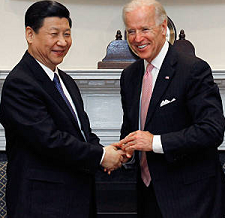Government & State Pension Funds are the second largest group investing into Chinese companies. The vast majority of the amounts held from U.S. pension or sovereign funds is from  the California Public Employees Retirement Systems (CalPERS), which is estimated to have half a billion dollars in investments across several state-controlled companies such as China Mobile, China Telecom, China Unicom, and a variety of smaller stakes in other companies, including rail equipment manufacturer CRRC Corp., China Communications Construction Co. Ltd., and China Railway Construction Corp. Ltd. According to a CNN report the recent ban to Americans from investing in Chinese firms decreed by President Trump, «set to take effect January 11, comes as trade and technology battles are heating up between the world's two largest economies». Trump's order bans US investors from owning or trading any securities that originate or are exposed to those firms. This includes pension funds. A senior official of the Ministry of Foreign Affairs told CNN that «the US government "maliciously slandered" legitimate collaboration between China's military and civilian companies and "unreasonably suppressed Chinese companies".»
the California Public Employees Retirement Systems (CalPERS), which is estimated to have half a billion dollars in investments across several state-controlled companies such as China Mobile, China Telecom, China Unicom, and a variety of smaller stakes in other companies, including rail equipment manufacturer CRRC Corp., China Communications Construction Co. Ltd., and China Railway Construction Corp. Ltd. According to a CNN report the recent ban to Americans from investing in Chinese firms decreed by President Trump, «set to take effect January 11, comes as trade and technology battles are heating up between the world's two largest economies». Trump's order bans US investors from owning or trading any securities that originate or are exposed to those firms. This includes pension funds. A senior official of the Ministry of Foreign Affairs told CNN that «the US government "maliciously slandered" legitimate collaboration between China's military and civilian companies and "unreasonably suppressed Chinese companies".»
Americans have Billions invested in companies with ties to Chinese Military
Nov.23.– President Donald Trump’s latest executive order bars U.S. investors from holding ownership stakes in a list of 31 Chinese companies designated to have ties with various Chinese Communist Party (CCP) military apparatuses.
This order, while somewhat limited in scope, ensnares several well-known Chinese companies, including non-public companies such as Huawei and publicly traded companies such as China Mobile and Hangzhou Hikvision. The 31 companies were previously designated by the Pentagon as being “owned or controlled” by the People’s Liberation Army (PLA), the official name of the Chinese military. (The list of companies can be found here and here.)
The action could be a sign of things to come for Chinese companies with close ties to the CCP; U.S. capital could prove increasingly hard to come by. In addition, examining the foreign ownership base of these companies reveals that a number of them are partially owned by prominent U.S. investment firms, insurance companies, and pension funds.
Trump’s latest measure at restricting Chinese companies would prevent U.S. capital from funding China’s military and intelligence agencies that could hurt U.S. interests. It bans U.S. citizens and companies from purchasing new shares of the listed companies beginning Jan. 11, 2021. Current investors who own shares of these companies have about a year, until November 2021, to exit their investments.
(...)
[ Full text ]
Comments powered by CComment